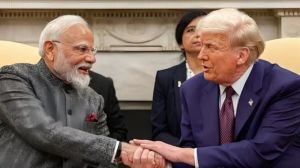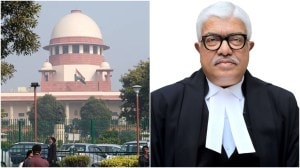Judiciary vs Parliament: Minister says House supreme
With Lok Sabha members across party lines voicing their concerns over...

With Lok Sabha members across party lines voicing their concerns over “judiciary stepping into domains of legislature and executive”, the Government on Tuesday said that the supremacy of Parliament “can be restored” if Parliament resolves to do so.
Replying to a debate on the need for harmonious functioning of legislature, judiciary and executive in the Lok Sabha, Law Minister Hansraj Bhardwaj said, “This House is supreme. If the House resolves to restore the supremacy of Parliament, it can be done within two minutes.” He quoted former Chief Justice of India Patanjali Shashtri — “Parliament has the plenary powers to amend the Constitution” — to reinforce his view. “We want to restore the pre-1993 status,” he declared.
A Constitution bench of the Supreme Court ruled in the ‘SC Advocates on Record versus the Union of India’ case in 1993 that the executive would have no role in the appointment of judges. Ever since then, the appointments have been made on the basis of recommendations of a collegium of senior judges of the apex court.
Responding to the point made by Speaker Somnath Chatterjee during the debate that “India is the only country where judges appoint judges”, Bhardwaj said unless the decision of the Supreme Court on the issue is reviewed by a larger bench, the present arrangement would continue. The current system, he pointed out, does not give primacy to even the Chief Justice. He is helpless if his colleagues do not agree with him, he said. The minister said the Cabinet advises the President, while the judiciary does not.
He called for the co-operation of the House for amending the Constitution to deal with the issue. “If there is a consensus, we can immediately do that.”
Bhardwaj said the Government would pursue the National Judicial Commission Bill to deal with issues pertaining to the accountability of the judiciary. The report of the standing committee, according to him, is in and the Bill would come to the House soon for consideration. The proposed legislation would be “the beginning”. “We can improve upon it later,” he added. The three wings of the system — legislature, executive and judiciary — will have to provide for “separate mechanisms to introduce probity.”
When Chatterjee sought to know if one organ of the state can discharge the functions of the other, Bhardwaj said, amidst laughter, “there can be no organ transplant,” adding “organ transplant is not permitted (by the Constitution).” “It will be the death of democracy,” he said. While underlining that the government has to be sensitive to both Parliament and the judiciary, he said the power of the judiciary “must be understood in a proper perspective.” Elaborating, he said “law is what Parliament passes” and the court can examine if it is in conformity with the Constitution. “Actions of the Government must conform to the law. The courts cannot do what the executive can,” he said, pointing out that they have to ask the executive to do so.
Gurudas Dasgupta of the CPI raised an objection after Bhardwaj said he often meets with vast sections of people from the intelligentsia who tell him that “the judiciary is doing better than you (executive).” “I don’t agree with that,” he promptly added. The Speaker said that is the impression created by the media.
What House panel has said
•On judicial accountability: “It is also a well settled principle of modern day governance that an authority deriving its existence from same source cannot claim to be absolute and unaccountable. All wings of Government belong to the people, when the legislature and the executive both are accountable, the judiciary cannot remain unaccountable and absolute”
•On Judges’ appointment: “The position prevailing before 1993 where in the executive and the judiciary were both involved in the consultative process and the executive had the primacy in appointment should be restored.”





- 01
- 02
- 03
- 04
- 05


























